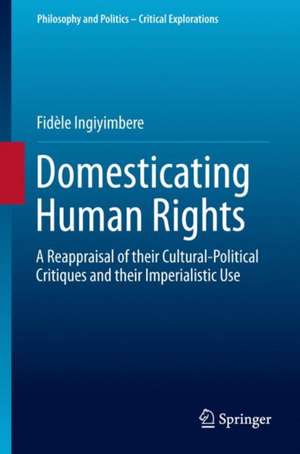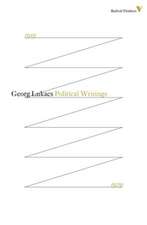Domesticating Human Rights: A Reappraisal of their Cultural-Political Critiques and their Imperialistic Use: Philosophy and Politics - Critical Explorations, cartea 4
Autor Fidèle Ingiyimbereen Limba Engleză Hardback – 7 iun 2017
Thus, after elaborating and exposing these criticisms, the book confronts them to the human rights theories of John Rawls and Jürgen Habermas, in order to see whether they can be addressed. Unfortunately, they are not. Therefore, having shown that these two philosophical accounts of human rights do not respond convincingly to those the postco
lonial challenges, the book provides an alternative conception that draws the understanding of human rights from local practices. It is a multilayer conception which is not centered on state, but rather integrates it in a larger web of actors involved in shaping the practice and meaning of human rights. Confronted to the challenges, this new conception offers a promising way for addressing them satisfactorily, and it even sheds new light to the classical questions of universality of human rights, as well as the tension between universalism and relativism.
| Toate formatele și edițiile | Preț | Express |
|---|---|---|
| Paperback (1) | 641.85 lei 6-8 săpt. | |
| Springer International Publishing – 12 aug 2018 | 641.85 lei 6-8 săpt. | |
| Hardback (1) | 648.24 lei 6-8 săpt. | |
| Springer International Publishing – 7 iun 2017 | 648.24 lei 6-8 săpt. |
Din seria Philosophy and Politics - Critical Explorations
-
 Preț: 226.46 lei
Preț: 226.46 lei - 20%
 Preț: 567.63 lei
Preț: 567.63 lei - 24%
 Preț: 633.27 lei
Preț: 633.27 lei -
 Preț: 394.29 lei
Preț: 394.29 lei - 15%
 Preț: 635.12 lei
Preț: 635.12 lei -
 Preț: 381.43 lei
Preț: 381.43 lei - 15%
 Preț: 580.17 lei
Preț: 580.17 lei -
 Preț: 384.31 lei
Preț: 384.31 lei - 18%
 Preț: 900.49 lei
Preț: 900.49 lei - 18%
 Preț: 725.92 lei
Preț: 725.92 lei - 15%
 Preț: 466.95 lei
Preț: 466.95 lei - 18%
 Preț: 728.43 lei
Preț: 728.43 lei - 15%
 Preț: 634.68 lei
Preț: 634.68 lei - 15%
 Preț: 707.78 lei
Preț: 707.78 lei - 15%
 Preț: 690.76 lei
Preț: 690.76 lei - 18%
 Preț: 723.06 lei
Preț: 723.06 lei - 18%
 Preț: 721.51 lei
Preț: 721.51 lei - 18%
 Preț: 726.55 lei
Preț: 726.55 lei -
 Preț: 369.56 lei
Preț: 369.56 lei - 18%
 Preț: 895.76 lei
Preț: 895.76 lei - 15%
 Preț: 696.35 lei
Preț: 696.35 lei - 15%
 Preț: 701.90 lei
Preț: 701.90 lei - 15%
 Preț: 642.83 lei
Preț: 642.83 lei - 20%
 Preț: 566.51 lei
Preț: 566.51 lei - 15%
 Preț: 585.73 lei
Preț: 585.73 lei - 15%
 Preț: 642.18 lei
Preț: 642.18 lei - 18%
 Preț: 731.73 lei
Preț: 731.73 lei -
 Preț: 390.25 lei
Preț: 390.25 lei
Preț: 648.24 lei
Preț vechi: 762.64 lei
-15% Nou
Puncte Express: 972
Preț estimativ în valută:
124.06€ • 128.53$ • 103.53£
124.06€ • 128.53$ • 103.53£
Carte tipărită la comandă
Livrare economică 22 martie-05 aprilie
Preluare comenzi: 021 569.72.76
Specificații
ISBN-13: 9783319576206
ISBN-10: 3319576208
Pagini: 315
Ilustrații: XI, 315 p. 1 illus.
Dimensiuni: 155 x 235 x 24 mm
Greutate: 0.64 kg
Ediția:1st ed. 2017
Editura: Springer International Publishing
Colecția Springer
Seria Philosophy and Politics - Critical Explorations
Locul publicării:Cham, Switzerland
ISBN-10: 3319576208
Pagini: 315
Ilustrații: XI, 315 p. 1 illus.
Dimensiuni: 155 x 235 x 24 mm
Greutate: 0.64 kg
Ediția:1st ed. 2017
Editura: Springer International Publishing
Colecția Springer
Seria Philosophy and Politics - Critical Explorations
Locul publicării:Cham, Switzerland
Cuprins
Chapter 1 Introduction.- Chapter 2 Human Rights as an Imperialist Ideology.- Chapter 3 Humanitarian Intervention as Neocolonialism.- Chapter 4 Rawls and the Challenges to Human Rights.- Chapter 5 Habermas and the Challenges to Human Rights.- Chapter 6 Conceiving Human Rights from Local Practices.- Chapter 7 Conclusion: Revisiting Old Questions.
Notă biografică
Fidèle Ingiyimbere was born in Burundi and grew up there, where he had his primary and secondary education. He owns a BA in Philosophy from les Facultés Jésuites de Paris (Centre Sèvres), an MS in Philosophy from Université Catholique d’Afrique Centrale-Institut Catholique de Yaoundé-Cameroun, and MA and a PhD in Philosophy from Boston College. He also holds a BA in Theology from Hekima University College in Nairobi-Kenya and STL from Boston College. His research covers areas of phenomenology and political-social questions, with special attention to the African context. His publications include a book on Maurice Merleau-Ponty, Etre et Expression, esquisse d’une ontologie chez Maurice Merleau-Ponty, and another on Human Rights as Means for Peace: The Catholic Understanding of Human Rights and the Catholic Church in Burundi, and many articles in various journals. My current interests is to continue my theological reflection on the Catholic Church in Burundi from an ethical perspective, and apply phenomenology to the understanding of human rights, as well as to engage with postcolonial discourse with regard to African context.
Textul de pe ultima copertă
This book develops a philosophical conception of human rights that responds satisfactorily to the challenges raised by cultural and political critics of human rights, who contend that the contemporary human rights movement is promoting an imperialist ideology, and that the humanitarian intervention for protecting human rights is a neo-colonialism. These claims affect the normativity and effectiveness of human rights; that is why they have to be taken seriously. At the same time, the same philosophical account dismisses the imperialist crusaders who support the imperialistic use of human rights by the West to advance liberal culture.
Thus, after elaborating and exposing these criticisms, the book confronts them to the human rights theories of John Rawls and Jürgen Habermas, in order to see whether they can be addressed. Unfortunately, they are not. Therefore, having shown that these two philosophical accounts of human rights do not respond convincingly to those the postco
lonial challenges, the book provides an alternative conception that draws the understanding of human rights from local practices. It is a multilayer conception which is not centered on state, but rather integrates it in a larger web of actors involved in shaping the practice and meaning of human rights. Confronted to the challenges, this new conception offers a promising way for addressing them satisfactorily, and it even sheds new light to the classical questions of universality of human rights, as well as the tension between universalism and relativism.
Thus, after elaborating and exposing these criticisms, the book confronts them to the human rights theories of John Rawls and Jürgen Habermas, in order to see whether they can be addressed. Unfortunately, they are not. Therefore, having shown that these two philosophical accounts of human rights do not respond convincingly to those the postco
lonial challenges, the book provides an alternative conception that draws the understanding of human rights from local practices. It is a multilayer conception which is not centered on state, but rather integrates it in a larger web of actors involved in shaping the practice and meaning of human rights. Confronted to the challenges, this new conception offers a promising way for addressing them satisfactorily, and it even sheds new light to the classical questions of universality of human rights, as well as the tension between universalism and relativism.
Caracteristici
Only book to develop a normative theory of human rights from local perspective, without falling into relativism Reconsiders the universality of human rights and goes beyond the dualism relativism-universalism Combines a serious critique of the third world and the imperialist views of human rights Draws from different sources to build a normative account of human rights Advocates for a reshaping of international law, but decentralizing it from the state, and integrates the role played by other actors










